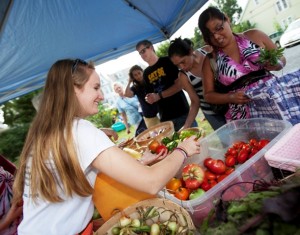If you live in Easton’s West Ward neighborhood, it’s no easy task to run out for a bag of carrots or a head of lettuce or some crisp red apples.
For many residents, the closest grocery store where fresh produce is sold is about two miles away, and the corner grocery stores in the neighborhood tend to stock processed convenience foods instead of fresh fruits and vegetables.
In this “food desert,” people have limited access to fresh, healthy, and affordable food.

Allie Nagurney ’16 distributes fresh produce from the “Veggie Van” to Easton residents at the community garden on 10th and Pine streets.
It’s a problem that the West Ward Neighborhood Partnership (WWNP) has been attempting to address in various ways, including organizing 13 community gardens and an urban farm and offering gardening classes. However, more work needs to be done.
This year, help is coming from Technology Clinic, a two-semester interdisciplinary course that focuses on finding solutions to real-world problems.
At the suggestion of the WWNP, students began exploring solutions, such as a vegetable truck, vegetable stands, and putting vegetables into corner stores and full service food stores.
They determined that a truck would be a good place to start. Over the summer, the “Veggie Van” distributed free fruit and vegetables grown at the community gardens and Lafayette’s LaFarm to residents throughout the neighborhood. They have also been talking with representatives of the Easton Farmers’ Market and the Lehigh Valley Buy Fresh Buy Local organization about opportunities to collaborate with local farmers to stock the van.
Emily Zangla ’14, a biology major, has some familiarity with the food desert issue in the West Ward. She previously interned with the Easton Farmer’s Market, where she spent time in the West Ward encouraging residents to come to the market and use food stamp benefits to purchase fresh produce.
Zangla’s involvement with the food desert has piqued her interest in public health. This summer, she interned at the Boston University Slone Center for Epidemiology.
“I anticipate that the creativity and teamwork I have learned through the Technology Clinic and continuous work on incorporating produce into the diets of the West Ward residents will prepare me well for a career in medicine,” she says.
Throughout the spring semester, Tech Clinic students focused on learning about the problems the West Ward faces and brainstorming solutions. They researched similar initiatives in other areas of the country and talked to people and organizations familiar with the problem and potential solutions. They will continue their work in the fall.
Audrey DaDalt ’15, a government and law major, says that the experience has helped her learn the power of brainstorming to find workable solutions to problems.
“Because Tech Clinic is an interdisciplinary course, team members come from a variety of backgrounds, so everyone contributes a unique interpretation of the problem and builds off each other’s ideas,” she adds.
Geology major Allie Nagurney ’16 has been helping to develop a website that will be updated weekly with lists of vegetables available at two stands in Easton.
“Our group worked incredibly well together and every person brought a fresh perspective to the topic,” she says. “Looking forward, this class has given me a greater appreciation of the Easton community and I hope that I can continue to work with all the people that I have met this semester.”

1 Comment
Comments are closed.